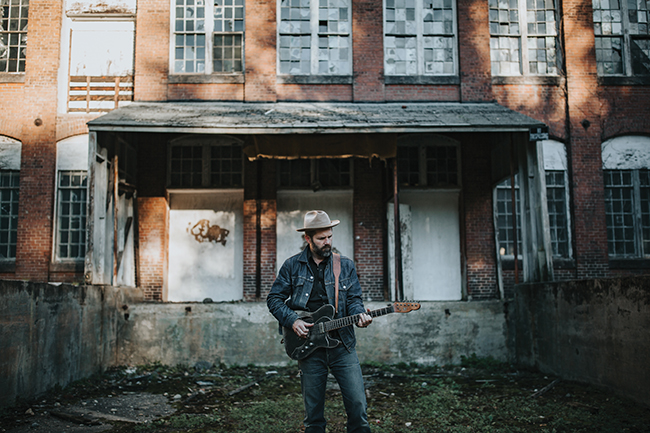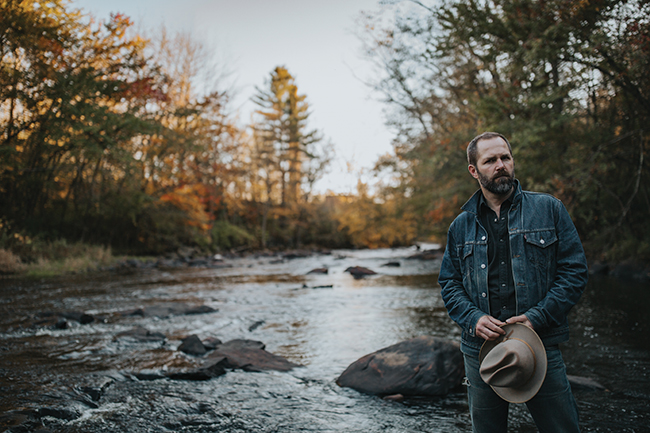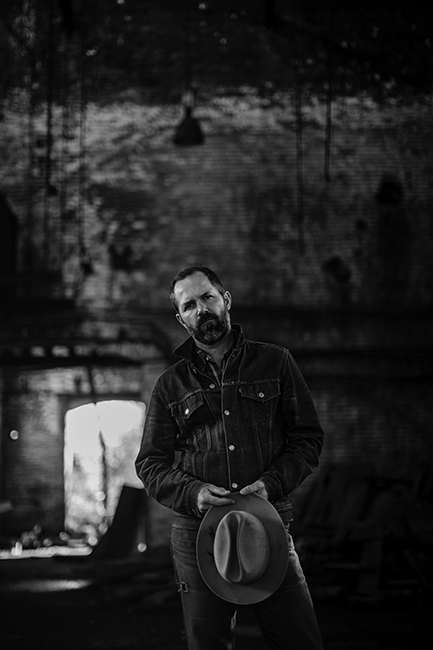Interview: Jeffrey Foucault – Blood On The Tracks
Jeffrey Foucault has long been on our radar thanks not just to his stellar songs and musicianship, but also the remarkable way his records sound. With his new album, Blood Brothers, showing that he’s lost none of his touch, Huw Price chats to the Wisconsinite about tone, time and old typewriters…
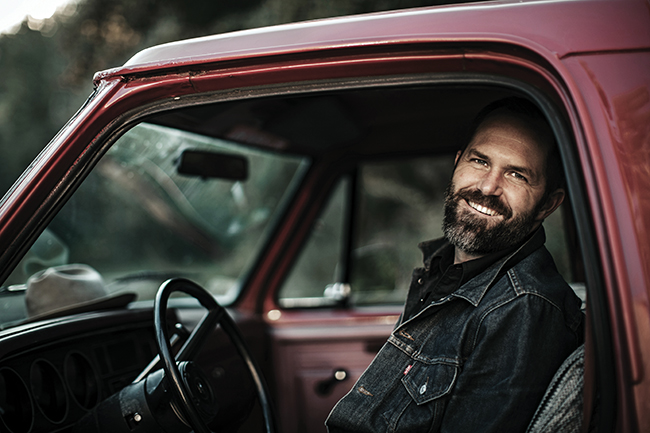
Image: Joe Navas
Since the 2001 release of his debut Miles From The Lightning, Jeffrey Foucault has been carving out a critically acclaimed career as a singer, songwriter, guitarist and producer. Jeffrey first picked up guitar when he was 17 after his father showed him a few chords. He was soon figuring out how to play simple cowboy chords and James Taylor songs from the 1970s. He became obsessed; sitting up all night playing, sleeping through school the next day and spending all his time daydreaming about guitars.
Those late nights clearly weren’t wasted, as Jeffrey has just shared his 11th studio album Blood Brothers with the world, and once again it’s a joy to the ears – recorded live onto tape at Pachyderm Studios in rural Minnesota.
During his early career Foucault was more in the ‘singer-songwriter’ vein when it came to his guitar skills, but he’s been playing a lot more in recent years – both on his records and other people’s. Despite that, he’s still unerringly humble and self-deprecating about his talent.
�“I didn’t trust my singing or my playing to any great extent, because I started late,” he admits. “I never felt that I was as facile on the instrument as I wanted to be and I was already out on the road before I had the 10,000 hours needed for mastery. So initially I considered myself to be a writer foremost – basically a typewriter who also happened to play guitar.
“That satisfaction you initially get from being able to play a chord without muting anything, there’s a diminishing return. Then you learn other people’s song’s and that’s really satisfying, but then there’s a diminishing return on that so you start writing your own songs. It started with the guitar but that led along to the songwriting.”
© JoeNavas
Plugging In
Foucault has also been known primarily as an acoustic player for much of his career, but he’s begun to embrace the electric guitar, in part as he feels like his skills have improved.
“I’ve became a more technical player,” he suggests. “I started playing bottleneck and electric guitar and now I’ve played a load of solos on records I’ve produced for other people. I played all the leads on my wife, Kris Delmhorst’s, last record. I’m comfortable playing in a variety of settings and I know how to get the tones I want. I’m a serviceable guitar player, nothing flashy.”
Indeed, he’s so comfortable as an acoustic player now that he can’t really choose between acoustic or electric any more. “It’s about 50/50,” he confirms. “I bring both on the road. I have a Gibson J-45 from the 40s – it’s either a ’46 or ’47. That’s my road acoustic and I bring one of my electrics, too. I have a few, but most recently my road electric is a Resophonic made by a company called Mule out of Michigan.”
His embrace of the electric guitar has also seen Jeffrey develop a passion for amplifiers – specifically old Gibson amps from the company’s golden age.
“Right now I have seven of them, so I need to get rid of a few!” he chuckles. “I particularly like the GA-8s from the 50s – they are really lightweight and I can put one in the overhead compartment of a jet or even underneath the seat in front of me.
“I specifically like the Gibson tone and I like turning a five-watt amp up to about 12 o’clock. That’s the break point where it’s still clean and you can play with force. For my last three records I worked with a great guitarist called Bo Ramsey and I learned it doesn’t matter what’s on your pedalboard. It all comes down to three things – the guitar, the person who’s holding it and the amplifier.
“Every sound, with the exception of a few simple things like tremolo and reverb, you should be able to get by being who you are. If you want to work on your tone, you really should be working on your touch.
“Bo will use an early 50s Fender TV Deluxe and he has that thing running really hot, but he barely touches the guitar when he’s playing. He doesn’t need a pedal for overdrive because he can get that just by digging in.
“What I really like about the GA-8 is that it behaves a lot like a low-watt Fender. I can play on stage with a full band and all I have to do is put a mic on it and run it back through the monitors. It cuts down on stage volume, it’s perfectly loud and balanced enough and gives you tons of low end information without being too aggressive or nasal.”
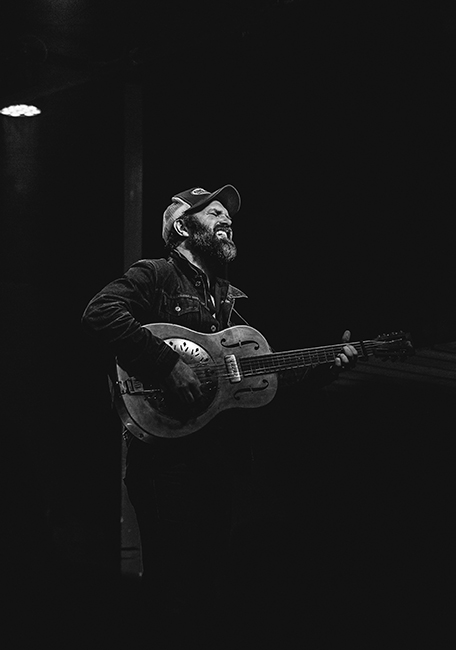
© Nikki A. Rae
Keep It Small
Given his love of cranked small amps on the road, it’s no surprise that Jeffrey favours a similar approach in the studio, but again he keeps things organic, simple and raw.
“Absolutely, they’re there in the room with me” he confirms. “I really have no interest in having a band that plays loud. I understand that it’s viscerally impactful to hear a band play really loud, and I can get behind that. But with my band, if we show up at the main stage of a festival, we play at a reasonable volume and I don’t think it distracts from the power of what we’re doing to play quiet.
“A lot of the time I gig with Billy Conway. When we’re a duo, our rule is you’ve got to be able to carry everything you’re going to play into the club in one trip. Billy has a drum kit in a suitcase with a snare drum, a ride cymbal and a Low Boy [beater]. The empty suitcase is used as the bass drum.”
Unsurprisingly then, Foucault doesn’t have much truck with overly processed or intricate live set-ups.
“I play my acoustic with a Fishman magnetic pickup and a Rare Earth blender for the internal microphone through a DI box,” he explains. “Because it’s a Gibson, and because I hate the sound of DI acoustics, I put a microphone in front and blend it about 50/50 to get the natural sound of the guitar.
“There is no pickup that can really make an acoustic guitar sound like an acoustic. Whatever pickup you use, without a microphone it’s still going to sound more like the guitar preset on a synthesiser.”
When it comes to electrics, it’s not all straight into the amp as you would expect, but nothing too fancy. “I have an electric running through a pedalboard into my GA-8,” he notes. “But at this point my pedalboard just has three Strymon pedals and one Electro-Harmonix 720 looper.”
© JoeNavas
Playing By Ear
Jeffrey has been doing a fair bit of production work in recent years – and given the wonderfully organic way his records sound, it’s no surprise. But what is unexpected, is that Foucault has never had any formal training in production or engineering.
“No, it’s all just stuff I picked up along the way,” he tells us. “I tried a lot of different studios and one of the reasons I started producing for other people was that it gave me the opportunity to explore different engineering approaches. Like putting the whole band in one room, or just putting the drums in isolation.
“Also whether you preserve line of sight for everybody and whether you put all the amps in cupboards or try and use the room sound. All of that impacts how a record sounds and feels.”
When it comes to his approach to recording, its no surprise that he tries to keep things as organic as possible. “I like the naturalness of sound moving through the air,” Jeffrey enthuses. “That’s how we hear sound and yet it isn’t always the way we record stuff. It’s that funny relationship between the illusion of reality and the reality of illusion. There’s always a sliding scale in the studio between those two things.
“If I’m going to listen to someone playing acoustic guitar, I’m not going to place my ears three inches from the soundhole or the 14th fret. And I’m not going to listen to a singer real close up.
“Of course there are things you can only do as a singer when you’re close mic’d. It gives you the opportunity to create these illusions, like being able to play your guitar at a volume that people would never hear in relationship to your vocal if they were in the room with you. That can be really satisfying.”
We note that Jeffery’s records often sound like they’re capturing a specific and unique moment in time, and its clearly a facet of the process that he enjoys.
“That’s the only way, isn’t it?” he smiles. “If you’re good enough musicians, and you’re ready to play, you might approach it a few different ways on the fly. On one of them something cool happens and when it does, a good engineer will be rolling.
“If you want to be more painterly about it, make it a more lapidary thing by recording in sequence, there are things you can gain from that. But there are also things that you will lose and the one thing you will lose for certain is the variability that creates magic.”
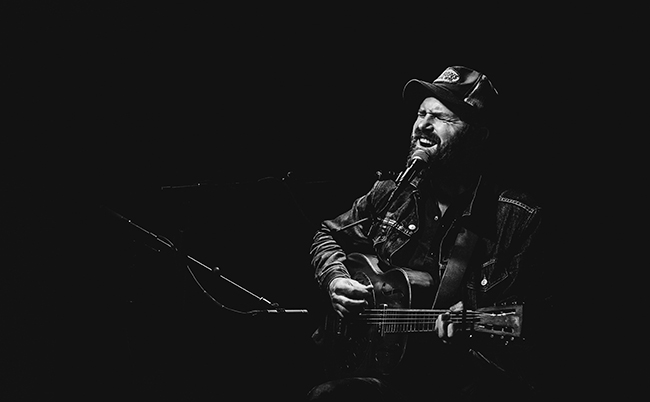
© Nikki A. Rae
Lighten Up
Jeffrey’s records often have a dark and brooding persona about them, but Blood Brothers has a lightness of touch and an airy quality to it – something it that turned out in stark contrast to his mindset going into the writing process.
“The intention is always to do something different,” he insists. “I would never consciously try to repeat something that has happened recently, but America has been going off the rails and has been for quite a while and I’m certainly upset enough about our politics and cultural situation that I expected the songs to be darker.
“But when you sit down to write, you think you’ve got a notebook full of songs about different stuff, but the truth is they’re always more or less about the same stuff. It’s because it’s just you and your brain, and you’re thinking about the same shit over and over.
“That’s what happened with Blood Brothers – because I was thinking about home, family and the relationship between love and time. I’m in my early 40s and I’m making sense of my own life, my parents’ lives and my children. That’s a heavy place to be, but I focused on the important stuff with more open-handedness and light.
“It’s true I’ve made a lot of dark records and I happen to enjoy sad music. I really believe in the blues, but not as an historical reenactment. It’s an existential proposition and a reaction to the pain of being alive that is uniformly felt. I love it, but that doesn’t mean it’s the only way to pay attention to music.
“The moment you say something as blanket as all art reacts to death or pain, or any twee post-modernist thing, you should think about ‘Do wah diddy, diddy dum, diddy do’. It doesn’t have anything to do with the pain of life, but it makes me feel perfectly fine. There’s room for both of those things.”
© JoeNavas
Old School Values
As a man who prefers to write his songs on a Smith Corona typewriter and uses an old Western Bell rotary phone, we wonder if keeping up to date with the fast-paced world modern music is much of a priority… but the answer is fairly unsurprising.
“No!” he says with a laugh. “I’m perfectly willing to be impressed and I do enjoy discovering great new records, but I can’t think of that many from the last few years that blew my mind. A lot of the stuff under the umbrella of Americana all sounds the same to me.
“Culturally we’ve been in a sort of Western world back eddy since the late 1990s. From the dawn of recorded music until then, if you played me a record I could tell you within about two years when it was made. But after the grunge stuff, can you really tell when a record was made based on the sonics?”
And that, as it turns out, is big part of what Foucault wants to get out of his music.
“I want to make recordings that sound like they happened at a particular time and place,” he enthuses. “Like a field recording, but you shouldn’t know when or where it was done. Pop music used to react to itself over and over again in a cycle of alienation and invention. Whatever was on top at any moment would alienate younger people who would look for something new that could be theirs.
“Half the time I go back to the old stuff because it will still leave me with questions as opposed to answers. Little Walter’s I Hate To See You Go, I’ll never be over that record and I’m going to listen to it until I die.
“When you think of classic tones, they’re only classic because we decided they are. The fact that I think a guitar should sound a particular way is really an artefact of the technology of the time. But there are still ways to make records that sound real.”
Jeffrey Foucault’s latest album, Blood Brothers, is available now on Blueblade/Tone Tree Music

